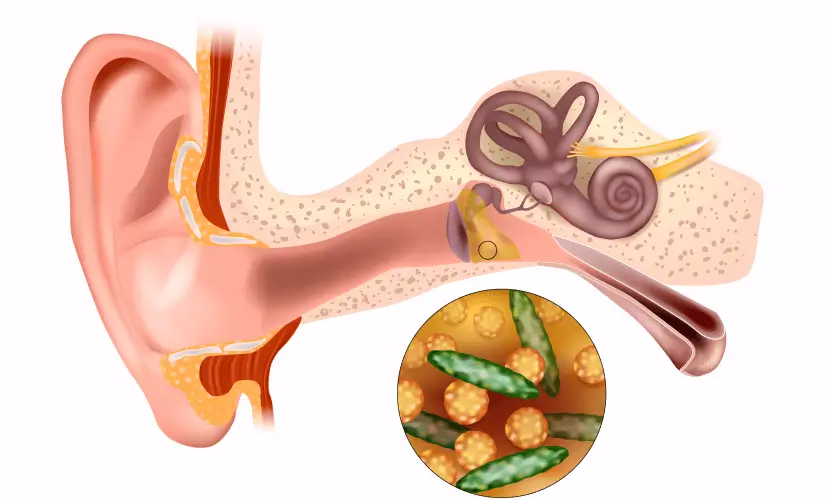-
Doctors
-
Specialities & Treatments
Centre of Excellence
Specialties
Treatments and Procedures
Hospitals & Directions HyderabadCARE Hospitals, Banjara Hills CARE Outpatient Centre, Banjara Hills CARE Hospitals, HITEC City CARE Hospitals, Nampally Gurunanak CARE Hospitals, Musheerabad CARE Hospitals Outpatient Centre, HITEC City CARE Hospitals, Malakpet
HyderabadCARE Hospitals, Banjara Hills CARE Outpatient Centre, Banjara Hills CARE Hospitals, HITEC City CARE Hospitals, Nampally Gurunanak CARE Hospitals, Musheerabad CARE Hospitals Outpatient Centre, HITEC City CARE Hospitals, Malakpet Raipur
Raipur
 Bhubaneswar
Bhubaneswar Visakhapatnam
Visakhapatnam
 Nagpur
Nagpur
 Indore
Indore
 Chh. Sambhajinagar
Chh. SambhajinagarClinics & Medical Centers
Book an AppointmentContact Us
Online Lab Reports
Book an Appointment
Consult Super-Specialist Doctors at CARE Hospitals

Tinnitus
Symptom, Causes, Diagnosis and Treatment
Tinnitus
Tinnitus, often described as ringing, buzzing, or the perception of sound where no external noise is present, affects millions globally, making it a prevalent concern for individuals across various age groups. The reasons for tinnitus are as diverse as its manifestations, ranging from exposure to loud noises to underlying health conditions, pointing to its complex nature and the necessity for comprehensive understanding and management strategies.
This blog embarks on a thorough journey through the intricacies of tinnitus, spanning from its defining symptoms and the most common tinnitus causes to diagnostic pathways and exploring both clinical and home remedies for tinnitus.
What is Tinnitus?

Tinnitus or ringing in the ears is the perception/sensation of sound that does not have an external source, meaning only the affected individual can hear it. It is commonly described as a ringing, buzzing, roaring, clicking, hissing, or humming sound in one or both ears.
Types of Tinnitus
The following are the main tinnitus types:
- Subjective Tinnitus: This is the most common form, where only the affected individual can hear the phantom sound. The noises can vary in pitch from low roars to high squeals.
- Objective Tinnitus: In rare cases, tinnitus can be heard by others (especially doctors), typically during an examination. Muscle contractions or blood flow issues may cause this type of tinnitus.
- Somatosensory Tinnitus: Sometimes, moving your head, neck, or eyes or touching certain body parts may produce tinnitus symptoms or temporarily change the quality of the perceived sound. This is called somatosensory tinnitus.
Symptoms
The symptoms of tinnitus can vary widely from person to person. You may hear phantom noises in one ear, both ears or in your head. These phantom sounds may ring, buzz, roar, whistle, hum, click, hiss, or squeal. Other symptoms may include:
- It may be soft or loud and may be low or high-pitched.
- It may come and go or be present all the time.
- It can affect one or both ears (unilateral or bilateral).
- Sometimes, tinnitus may be associated with headaches, dizziness, or vertigo.
- A person with tinnitus may experience difficulty falling or staying asleep due to noise, difficulty concentrating, or irritability.
What Causes Tinnitus?
Some common causes of tinnitus are as follows:
- Hearing Loss: In hearing loss, hair cells in the inner ear become damaged or bent and can leak random electrical impulses, causing the brain to perceive phantom sounds and leading to tinnitus.
- Ear Infections or Blockages: Ear infections or obstructions in the ear canal can change the pressure in the ear, potentially causing tinnitus.

- Injuries: Any injury in the head or neck region can affect the inner ear, nerves responsible for hearing or brain functions related to hearing. Such injuries often result in tinnitus in one ear.
- Medications: Certain medicines, including non-steroidal anti-inflammatory drugs (NSAIDs), antibiotics, cancer drugs, diuretics, antimalarial drugs, and antidepressants, can cause or worsen tinnitus.
- Underlying Medical Conditions: Several systemic conditions have been associated with tinnitus, including Ménière's disease, eustachian tube dysfunction, otosclerosis, muscle spasms in the inner ear, temporomandibular joint (TMJ) disorders, and acoustic neuroma.
How is Tinnitus Diagnosed?
Diagnosing tinnitus involves a comprehensive evaluation by an otolaryngologist (ENT doctor) or an audiologist. They may perform:
- Medical History: Your doctor will ask when your tinnitus symptoms began, how often they occur, and how they impact your daily life.
- Physical Examination: Doctors will use specialised instruments to perform a thorough examination of your ears, head, and neck.
- Hearing Tests:
- Audiological Evaluation: Doctors may conduct a comprehensive hearing test, known as an audiogram, to assess the function of different parts of your ear.
- Tinnitus Evaluation: During the hearing test, the audiologist may use specialised techniques to determine the pitch and intensity of your tinnitus.
- Imaging Tests: An audiologist may perform Magnetic Resonance Imaging (MRI), Computed Tomography (CT) scan, or ultrasound to identify issues in the ear structures or surrounding areas.
- Additional Tests: Depending on the symptoms and suspected underlying causes, additional tests may be recommended, such as:
- Blood Tests: Blood reports can check for anaemia, thyroid problems, or other medical conditions that may contribute to tinnitus.
- Vestibular Testing: For patients with suspected Meniere's disease or other vestibular disorders, tests like electronystagmography may evaluate balance and inner ear function.
What are the Treatments for Tinnitus?
There is no tinnitus cure, but various treatments are available to help manage the symptoms and make the tinnitus ringing in the ears or buzzing less noticeable.
- Treating the Underlying Cause: If an underlying health condition causes tinnitus, treating that condition may help alleviate the symptoms. Some examples include:
- Earwax removal
- Treating blood vessel conditions
- Changing medication
- Treating hearing loss
- Sound Therapy: When the cause of tinnitus is unknown or cannot be treated, sound therapy can help make the ringing or tinnitus buzzing less noticeable.
- White Noise Machines: These devices produce a sound similar to static or environmental sounds, like falling rain or ocean waves, which can help mask the tinnitus noise.
- Masking Devices: These devices produce a low-level but continuous noise. When worn in the ear, this noise suppresses tinnitus symptoms, just like hearing aids.
- Counselling and Therapy
- Behavioural Therapy: This treatment option aims to help people live with tinnitus by changing the way they think and feel about their symptoms.
- Tinnitus Retraining Therapy (TRT): In TRT, you will wear a device in your ear. It masks your tinnitus symptoms while you also receive directive counselling from a trained professional. Over time, TRT may help you feel less distressed by your tinnitus symptoms and notice it less.
- Lenire Device: It is one of the most recent technologies employed for the management of tinnitus. This non-invasive device, approved by the FDA in 2023, combines electrical stimulation and sound therapy to reduce the perception of tinnitus. It targets specific areas of the brain and nerves associated with tinnitus, potentially retraining the brain to perceive the sound differently.
- Medications: Doctors may prescribe medicines to reduce the severity of symptoms or complications.
When to See a Doctor
It's advisable to consult a doctor if you experience any of the following situations regarding tinnitus:
- If you have tinnitus regularly or constantly
- Your tinnitus is getting worse
- If tinnitus is affecting your sleep and concentration or making you feel anxious and depressed
- You have tinnitus that beats in time with your pulse
- You have tinnitus after a head injury
- Sudden hearing loss, weakness in the face muscles, or a spinning sensation (vertigo)
Risk Factors
While tinnitus can affect anyone, certain factors may increase the risk of developing or experiencing this condition:
- Prolonged exposure to loud noises
- Ageing
- Studies suggest that men are more likely to experience tinnitus than women
- Smoking and excessive alcohol consumption
- Certain systemic conditions, such as obesity, cardiovascular problems, high blood pressure, arthritis, and a history of head injury
Complications
Tinnitus can lead to various complications that significantly affect a person's quality of life & mental wellness. Some potential complications associated with tinnitus include:
- Anxiety and depression
- Sleep disturbances and fatigue
- Cognitive impairments such as concentration and memory.
- Hyperacusis (increased sensitivity to certain sounds) and misophonia (negative emotional reactions to specific sounds).
Home Remedies for Tinnitus
Several home remedies may help alleviate symptoms or make the ringing, buzzing, or hissing sounds more manageable.
- Keep a written log to identify your triggers and avoid them one at a time. Common triggers include caffeine, nicotine, alcohol, and excessive noise exposure.
- Establish a consistent sleep timetable and create a relaxing bedtime routine.
- Incorporate relaxation methods into your daily routine, like meditation & yoga, deep breathing exercises, or progressive muscle relaxation.
- Try masking the ringing with soothing background sounds, such as soft music, podcasts, or white noise devices that create the sounds of rainfall or ocean waves.
- Wear earplugs or noise-cancelling headphones when exposed to loud environments, such as concerts, construction sites, or operating power tools.
- Maintain a balanced diet rich in leafy greens, olive oil, seeds, nuts, and omega-3-rich fatty fish like salmon, which can help reduce inflammation.
Prevention
While tinnitus isn't always preventable, you can reduce your risk:
- Protect your ears from loud noises
- Wear ear protection in noisy environments.
- Monitor noise levels with smartphone apps.
- Limit volume when using headphones.
- Maintain healthy habits
- Exercise and eat a balanced diet.
- Limit alcohol, caffeine, and nicotine.
- Manage stress through meditation or yoga.
- Manage underlying conditions
Conclusion
Tinnitus, while challenging, is not an insurmountable condition. Early detection and regular hearing check-ups are crucial for preventing tinnitus, as they can help identify and address underlying causes like hearing loss before it worsens. By understanding its diverse manifestations, potential causes, and the array of diagnostic and treatment options available, individuals can take significant strides towards managing their symptoms effectively. The journey from recognising early signs to implementing tailored strategies underscores the importance of a proactive, multidisciplinary approach to tinnitus care.
FAQ's
1. How do I deal with my tinnitus?
Tinnitus can be a challenging condition, but several strategies can help you cope with it effectively:
- Identify and avoid triggers
- Manage stress and anxiety
- Improve sleep habits
- Incorporate sound therapy
- Protect your hearing
- Adopt a healthy lifestyle
2. What are the first signs of tinnitus?
The most common first sign of tinnitus is the perception of a ringing, buzzing, whooshing, humming, hissing, or throbbing sound in one or both ears or in the head. This phantom sound may be constant or intermittent and vary in pitch and intensity.
3. Can tinnitus go away?
The likelihood of tinnitus going away depends on the underlying cause. It often resolves with treatment if it's due to earwax buildup or an ear infection. Tinnitus from loud noise exposure may improve over time if there's no permanent damage. If it's linked to a medical condition like high blood pressure or a thyroid disorder, it may improve once the condition is treated.
4. Are there any risks or side effects from the treatment?
Most tinnitus treatments are generally safe and have minimal side effects.
5. Can ear wax cause tinnitus?
Yes, ear wax buildup can cause or contribute to tinnitus. Excessive earwax can obstruct the ear canal and interfere with sound transmission, leading to a perception of ringing, buzzing, or other phantom noises.
Still Have a Question?




